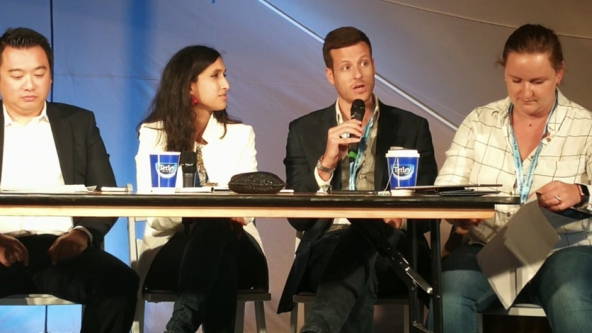Sam Handfield-Jones, Chief Product Officer at Octopus Labs, wonders why we worship corporate disrupters but discourage disruptive behaviour in children.
I feel quite lucky to do what I do. Working at Octopus means I get to help build innovative new stuff, supported by a very long-term approach from our founders. My job is basically to try and work out how to do things we don’t currently do, and how to do things we currently do in different ways.
Over time, through working with and observing lots of amazing people, I have started to recognise the three key qualities that make someone good at building something new. For me, so far it comes down to the following attributes:
- Being comfortable with ambiguity
- A high and innate level of curiosity
- Able to disregard how things are normally done
During my time at school, those traits were often dismissed, or at worst punished. Displaying these characteristics in a classroom setting would frequently find me earning the dreaded label of ‘disruptive’ (sorry Mum).
Creative corporate disruption
Today in the corporate world, being disruptive is viewed completely differently. Take the time to search google for ‘disruptive company’ and you’ll find millions of hits such as 2018’s Top Disrupters, Disruptor 100, The Festival of Disruption, and so on.
If you google ‘disruptive children’, the results are far less positive. The search findings tend to focus on what are perceived as negative and antisocial behaviours.
I couldn’t find ‘2018’s Top Disruptive Children’ — although I only made it to page three of the search results (blame it on my short attention span).
So why is disruption viewed as a huge positive for companies, but such a negative behavioural trait for children?
Living in the disruption era
The digital age has taught us to value creative disruption, and to worship corporate disrupters. Adulation and unprecedented wealth are heaped upon the successful founders and early employees of businesses that have successfully disrupted industries such as taxis, banking, hotels, food delivery, and more.
But the same behaviours – challenging conventional wisdom, pushing boundaries, throwing away the rulebook, are actively discouraged and usually result in punishment in school. To me, this demonstrates a big disconnect.
Entrepreneurship is seen as increasingly important for the UK to remain competitive in a world of artificial intelligence, automation, Brexit and Donald Trump. No one can rely on prior successes. But entrepreneurship does not have to be a binary thing.
Yes, you can be a founder of a company, but you can also make things better, faster, more exciting at the company you work for. How? By challenging the status quo.
The role of education
Teaching the concept of ‘entrepreneurship’ is not the answer. We need to start teaching children to develop the skills they’ll require in the modern working environment, and to help develop the comfort with ambiguity, critical thinking and problem solving we need in the future.
To create an environment where this happens, education needs to operate with a less strict syllabus. It should be delivered through more internet-based and peer-to-peer learning, and be tested with far more project-based tools.
We’ve reached an education inflexion point
Historically, asymmetry of information was the driver of education. The teacher had the books and the knowledge, and they imparted that to the lucky few through sitting in the classroom.
Today, through technology, everyone has access to all the information they want, provided they are willing to look for it. The ‘guardian of knowledge’ role is starting to look very outdated and may even be a barrier to the speed of learning.
But the bigger problem is this – the world is changing at a pace that is making it impossible for education to keep up. This is largely due to the way schools are forced to rely on centrally controlled government bodies to iterate curriculum and delivery models.
Modern languages
The result is that schools are teaching coding to kids in programming languages that will likely be obsolete in 15 years, when those kids are joining the workforce. And in all likelihood, in 15 years’ time software will be writing software anyway.
The only constant today is change, and we need to equip people with the tools to thrive in that environment.
That’s where peer-to-peer learning models start to look very interesting. You can see the benefit of small teams working together across functions in the workplace — Spotify’s organisational model is well-documented as a successful way to structure a business.
A new learning environment
And there are post-16 schools applying this thinking to the educational model with a focus on technology. In Ukraine, Paris and California there are free schools (known as the 42 schools) teaching tens of thousands of young people under a few key principles:
- No teachers: instead, a support team proposes projects to work on. The solutions will be shaped through internet-based knowledge and co-working
- No lectures: everything is project-based
- Open 24/7: work when you like not when the school is open
- Peer review: students validate each others’ work
These schools sound amazing to me, and a world away from the traditional model. By focusing on output rather than input, the students are able to solve the problem however they like. They get to deliver what they want, when they want to, and have the freedom to manage their own priorities.
Creating future flexibility
Ultimately, the only certainty today is that those skills that are currently relevant will become obsolete on an increasingly rapid timeframe. Anything we learn today will be obsolete or ‘legacy debt’ in five years’ time.
All we can do is help develop an educational delivery model that encourages self-learning, creativity, curiosity, the need to learn and iterate from peers. These are all the tools people need to reinvent their own skill sets, in the same way that successful companies look to.
Octopus has recently launched the Octopus Academy. We did this because we recognise that the UK is experiencing a digital skills crisis, and that by the year 2022 we will need at least another 1.2 million people in the UK to be technically and digitally skilled.
I think that, in our own way, we are trying to apply some of the philosophy of the 42 school model to the UK. And I’ve recently applied to the 42 school in Paris, so if I manage to win a place, I will let you know. This time, perhaps I can bring patterns of disruption to the learning environment – without fear of getting detention.


